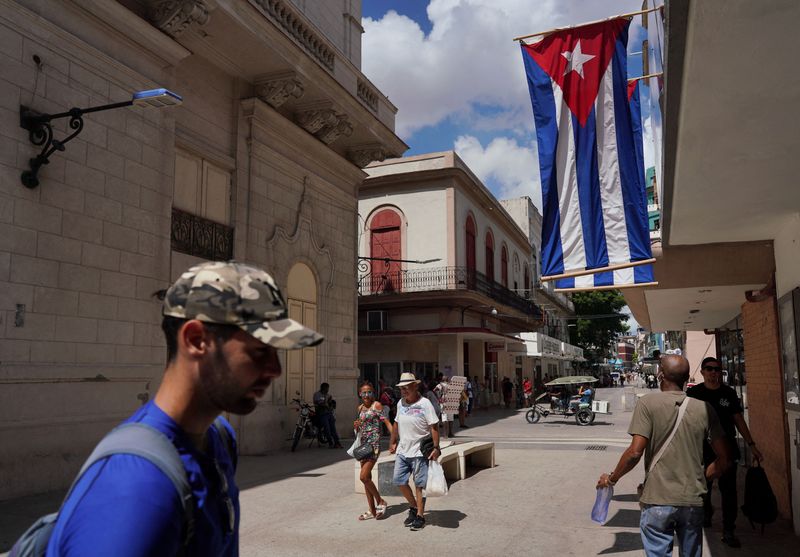Cuban economy minister sees gradual recovery despite long lines and blackouts
2022.07.21 21:34

Cuban flags are displayed at a commercial road in downtown Havana, Cuba, July 20, 2022. REUTERS/Alexandre Meneghini
By Marc Frank
HAVANA (Reuters) – Cuba’s economy has begun to recover from the effects of the pandemic and should grow 4% this year, its economy minister said, although most Cubans have seen little sign yet of relief from food and energy shortages.
Economy Minister Alejandro Gil said on Thursday that the economy grew 10.9% through March compared with the same period in 2021, when it was “nearly paralyzed” by the COVID-19 pandemic.
But it is still 7.3% below where it was in 2019.
“The goal is the gradual recovery of the economy to reach the levels of activity that we had in 2019,” Gil said.
Cubans are living through daily blackouts and food, medicine and fuel shortages, forcing them to wait in long lines for the basics or turn to a thriving black market.
There have been scattered, small protests this summer and more than 150,000 citizens have crossed the U.S.-Mexican border since October, according to the U.S. government.
“All Cubans on the island are suffering the consequences of the economic situation,” said Havana resident Daniel Rech Companioni after watching Gil give his report on state-run television.
“But really, the situation is critical. With power outages, food shortages – basic, elemental things a citizen should have,” he said.
The key tourism sector is still struggling. U.S. tourists are finding it hard to get to Cuba because of their government’s restrictions imposed on travel to the island, while other visitors are wary due to the crisis and following last year’s unrest. There were around 700,000 foreign visitors in the year to June, well under what is needed to reach a 2.5 million goal for the year.
After decades of decline due to management issues and supply shortages, this year’s sugar output was half of what was planned and the lowest since the 18th century.
Gil said inflation was 77% last year and 28% through June this year. Independent experts have said it reached triple digits in 2021.
Cuban economist Omar Everleny said he had not ruled out growth reaching 4% this year, but that continued U.S. sanctions, the pandemic, growing international inflation and the Ukraine war led him to doubt it.
Cuba’s economy is dependent on imports, he said, but the country had little cash and soaring fuel, food and shipping costs, undermining its efforts to recover.
“The reality is that the economy is much worse than last year. Therefore, it is very difficult for me to think that the 4% will be met,” he said.








